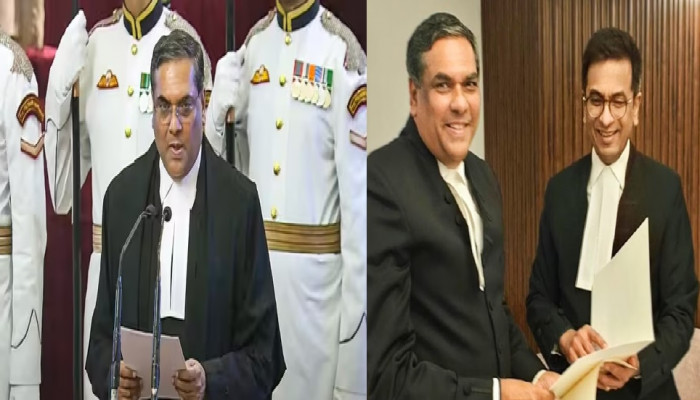Justice Sanjiv Khanna takes oath as 51st Chief Justice of India
- In Reports
- 11:13 AM, Nov 11, 2024
- Myind Staff
Justice Sanjiv Khanna has officially assumed office as the 51st Chief Justice of India, taking the oath today at Rashtrapati Bhavan. President Droupadi Murmu administered the oath, marking the beginning of Justice Khanna’s tenure as head of the judiciary. His term, however, will be brief, as he is set to retire in May 2025. Justice Khanna succeeds Justice D.Y. Chandrachud, bringing with him a wealth of judicial experience across varied and significant domains, including constitutional law, taxation, commercial law, and environmental issues.
Justice Khanna’s career is notable for his involvement in landmark judgments and his focus on issues of public significance. Among his significant contributions is his stance on the use of Electronic Voting Machines (EVMs) in elections, rejecting demands for a complete return to paper ballots in an April 2024 ruling. Instead, he suggested enhancing transparency by issuing slips with a party symbol or barcode after each vote, enabling a streamlined cross-verification process. This judgment followed significant debate on the reliability of EVMs, which saw widespread public scrutiny.
A champion of transparency, Justice Khanna has also played a pivotal role in decisions impacting electoral funding. In February 2024, he contributed to a major ruling that declared the electoral bonds scheme unconstitutional, citing risks to transparency in political donations and concerns about potential misuse. Justice Khanna dismissed arguments around donor privacy, noting that banking staff involved in managing these bonds already knew the identities of contributors.
Justice Khanna’s involvement extended to other high-stakes cases, including the abrogation of Article 370, which granted special status to Jammu and Kashmir. As part of a five-judge bench, he upheld the abrogation in 2023, asserting that this move did not endanger India’s federal structure. His viewpoint emphasised the need for national integrity while respecting regional autonomy.
In an earlier influential judgment in 2019, Justice Khanna had underscored the importance of judicial accountability by supporting the inclusion of the Chief Justice’s office under the purview of the Right to Information (RTI) Act. His ruling balanced transparency with privacy considerations, suggesting that disclosures about the CJI’s office should depend on the larger public interest. He also delegated this decision to the court's Chief Public Information Officer, setting a precedent for managing sensitive RTI requests with caution and accountability.
Justice Khanna also made headlines in July 2024, when he granted interim bail to former Delhi Chief Minister Arvind Kejriwal, then embroiled in a case under the Prevention of Money Laundering Act (PMLA). He raised questions about the necessity of the arrest, refraining from ruling on the legality of the charges but emphasising due process.
As Chief Justice, Justice Khanna’s decisions are expected to continue shaping critical aspects of governance and public accountability in India, contributing to a legacy built on transparency, justice, and judicial integrity.







Comments